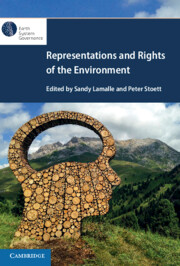Book contents
- Representations and Rights of the Environment
- Series page
- Representations and Rights of the Environment
- Copyright page
- Dedication
- Epigraph
- Contents
- Illustrations
- Tables
- Contributors
- Preface
- Acknowledgements
- 1 An Introduction
- Part I Challenges
- Part II Recollection
- Part III Perspectives
- 10 Rights of Nature, a New Perspective in Law
- 11 Property for Nature
- 12 Reimagining the Common Law
- 13 Democratic Representation, Environmental Justice and Future People
- 14 The Normative and Social Dimensions of the Transition towards a Responsible, Circular Bio-Based Economy
- 15 New Perspectives on Guardianship of Nature
- Index
- References
14 - The Normative and Social Dimensions of the Transition towards a Responsible, Circular Bio-Based Economy
from Part III - Perspectives
Published online by Cambridge University Press: 16 March 2023
- Representations and Rights of the Environment
- Series page
- Representations and Rights of the Environment
- Copyright page
- Dedication
- Epigraph
- Contents
- Illustrations
- Tables
- Contributors
- Preface
- Acknowledgements
- 1 An Introduction
- Part I Challenges
- Part II Recollection
- Part III Perspectives
- 10 Rights of Nature, a New Perspective in Law
- 11 Property for Nature
- 12 Reimagining the Common Law
- 13 Democratic Representation, Environmental Justice and Future People
- 14 The Normative and Social Dimensions of the Transition towards a Responsible, Circular Bio-Based Economy
- 15 New Perspectives on Guardianship of Nature
- Index
- References
Summary
This chapter reflects on the normative and social dimensions of the transition to a circular bio-based economy (CBE). It first argues that current practices in a CBE are framed within the market or economic logic and miss the normative dimension of the call for circularity. The transition to a CBE requires a fundamental reflections on the role of economic actors in the social and ecological environment with significant consequences for their business practices. Second, the chapter argues that the transition to a CBE requires an acknowledgement of the normative and social dimension of this transition at the meso and macro levels, and the establishment of an environmental and social logic on the micro level of business practices. Third, it argues that the concept of responsible innovation can help to articulate the normative and social dimension of the transition to a CBE, and enables the operationalisation of the environmental and social logic at the micro level. In this respect, responsible innovation can be understood as a driver for the transition to a CBE.
Keywords
- Type
- Chapter
- Information
- Representations and Rights of the Environment , pp. 334 - 352Publisher: Cambridge University PressPrint publication year: 2023

